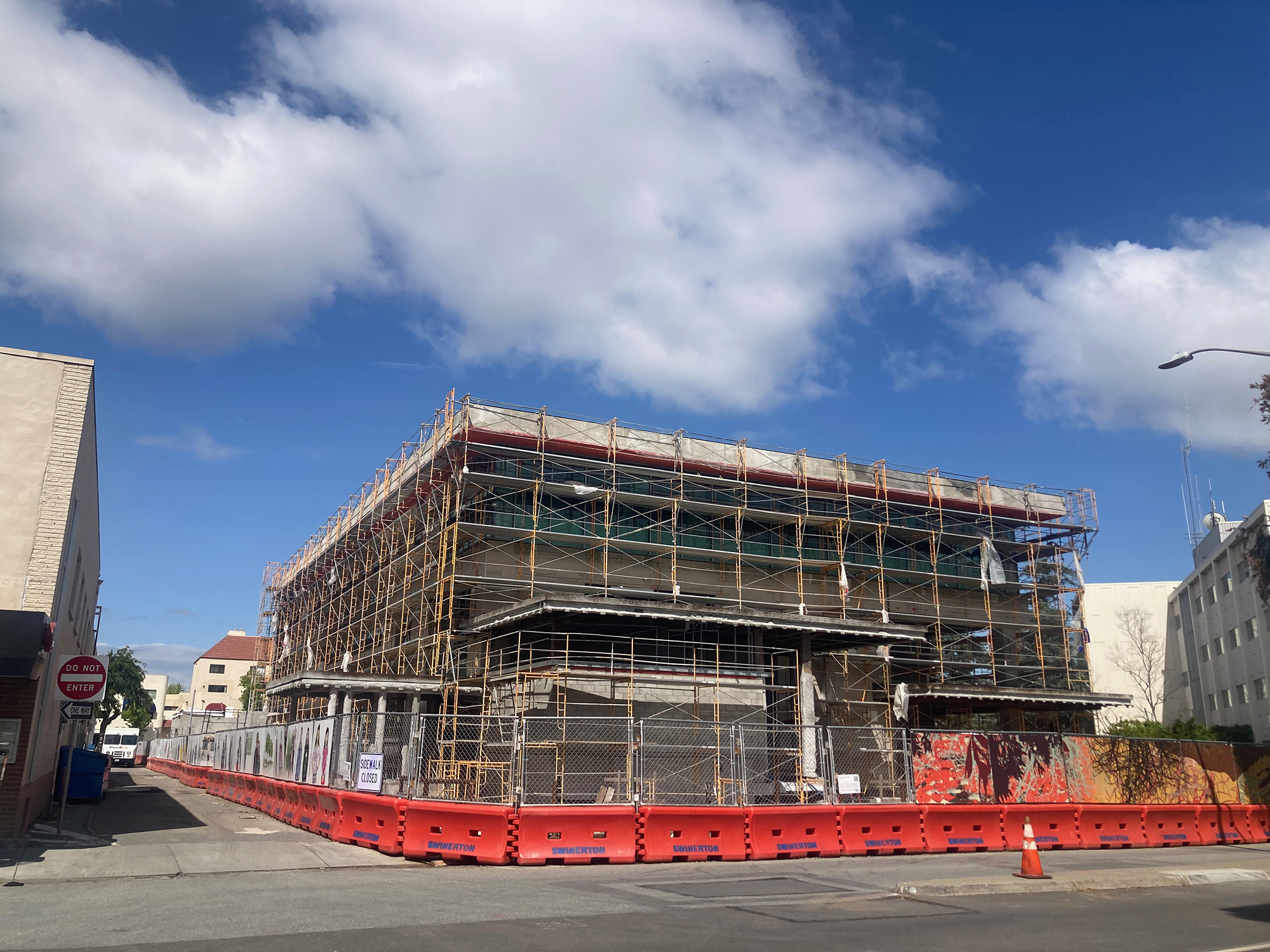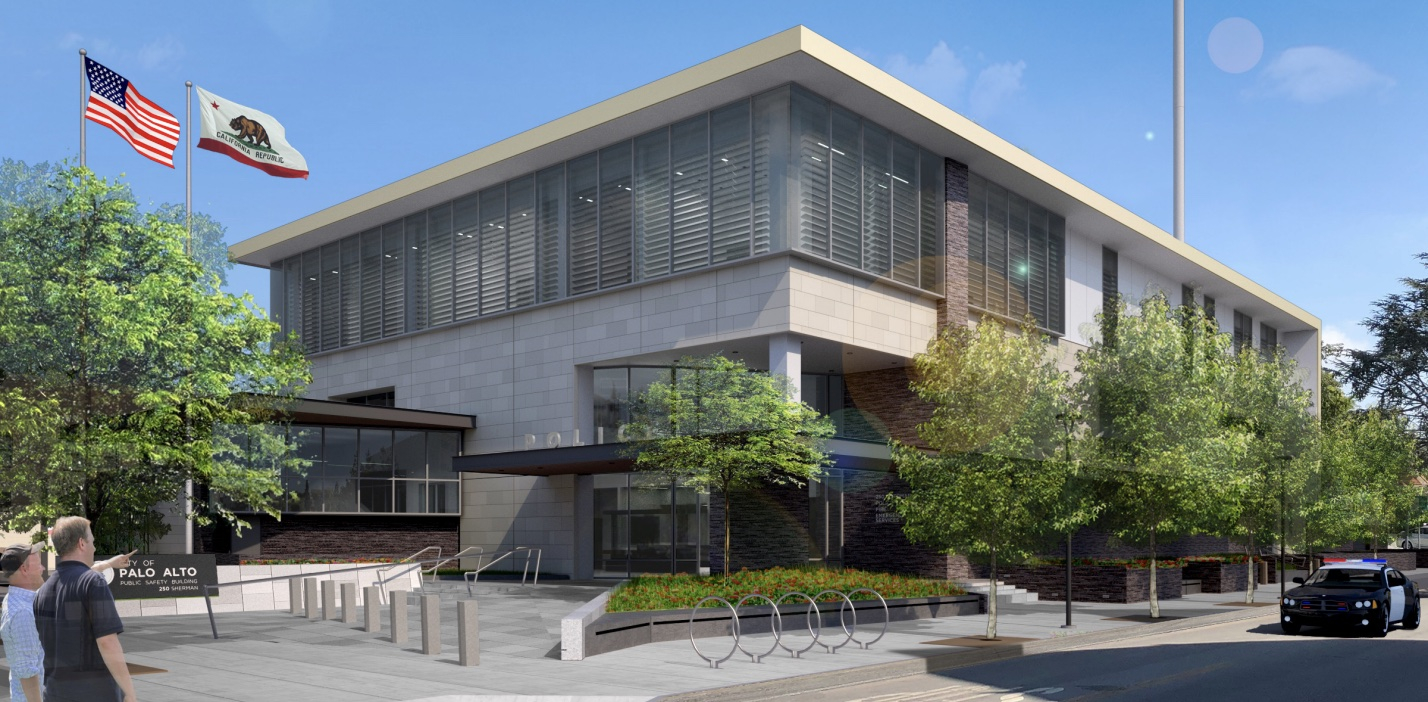Palo Alto and the contractors who are building the city's new police headquarters near California Avenue are in a legal battle over more than $3.5 million in change orders — requests for additional compensation for work that the companies allege was caused by incomplete plans and unexpected requirements.
According to documents obtained by Palo Alto Online through a Public Records Act request, the dispute primarily involves the city's main contractor, Swinerton Builders, and its subcontractor, Pacific Structures, the two companies behind most of the change orders and claims. Other companies involved include Swinerton's subcontractors Commercial Controls Corporation, Walters & Wolf, WSA Compliance, Helix Construction Company, Broadway Mechanical Contractors, Sandis, and Northern Services, according to the city.
The 15 change orders and claims were for work ranging from the electric wire sleeves required for the new building to the installation of doors in the building.
The City Council, which designated the new public safety building as its top priority more than a decade ago, discussed the claims and the potential litigation in a closed session on Monday night and did not take any formal action.
The new building at 250 Sherman Ave. will house the Police Department, the Office of Emergency Services and the administration of the Fire Department and is slated to be completed later this year. Workers recently completed electrical installation and removed the exterior scaffolding, according to a report from City Manager Ed Shikada. The $118-million project is now about 90% complete, and staff is preparing to move into the building in 2024, the report states.
The legal skirmish has been going on since at least November, when the city notified the contractors that it would reject — either wholly or in part — some of the requests for additional compensation. This includes a change order for $1.49 million from Pacific Structures in connection with construction of pre-cast stairs at the new building.
The city denied the change order in early November, arguing that the contractor had failed to comply with a contract provision requiring it to submit change orders "within 10 days of the occurrence of the circumstances giving rise thereto," according to a letter that Pacific Structures General Counsel Steve Cvitanovic wrote to the city on Nov. 30.
Pacific Structures took issue with the rejection. It argued that the added work was caused by city requirements. In disputing the city's rejection, Cvitanovic cited a court case in which a contractor was allowed to recover damages on a public works project in which extra work "was necessitated by the incorrect plans and specifications," notwithstanding the notice provision in the contract.
Pacific Structures maintained that it was directed to perform work relating to seam alignments at concrete decks, columns and walls "well above the requirements in contract documents and Pacific Structures' standard of care," according to the formal claim that the city discussed in the closed session. The change had an impact on the amount of labor required to finish the job and on the company's stair installation sequence, according to the claim.
The company noted that the circumstance giving rise to the cost impact occurred upon the completion of the work, making it impossible for Pacific Structures to meet the 10-day requirement.
"The impact could not have been discovered until after work completion because the final as-built condition was required for specific identification of additional scope," Jarrod Haering, president of Pacific Structures, wrote in the claim.
The claim for $1.49 million is the largest of 15 claims, with each stemming from a rejected change order.
Another claim entailed Pacific Structures' need to keep its craftsmen on site for longer than was expected, which cost the company an additional $205,403, it stated.
The documents show contractors' increasing frustration. On April 26, Haering filed a claim after the city rejected its change order for $333,520. He complained that his company discovered many errors, omissions, conflicts or ambiguities on the city's part.
"Pacific Structures has processed and implemented over $3.6 million in change orders on this project," Haering wrote. "This is a 27% increase from our original contract value. The volume of change on this project is grossly inconsistent with the industry norms. No reasonable contractor would have assumed or included staffing needs for a 27% increase in scope."
Swinerton also took issue with costly changes to the city's plans. In late June, it filed a claim for $257,338 relating to work on the audiovisual systems. The installation of the system was complicated by the city's review process, which required numerous modifications to the plans and caused delays in approving and ordering the needed materials, Swinerton asserted.
"In addition, in each submittal iteration, new comments were added that were not included in the previous iterations due to different entities reviewing the package each time," Swinerton wrote in its June 30 claim.
Swinerton in another claim said its workers and contractors had to delay work by nine days because the city required testing of building components that the company said had already been tested and certified in Los Angeles. In its claim for $142,592, Swinerton asserted that the testing requirement delayed its plans to pour concrete, and when the company asked the city if it could proceed with pours as per schedule while the testing was being performed, it was told that the work can proceed at "contractor's risk," according to the claim.
It didn't get the actual go-ahead to proceed with the pouring until days later, the claim stated, which created a "compensable impact."
James Devine, the attorney representing the subcontractor Commercial Controls Corporation (CCC), similarly noted that material costs that escalated due to city delays should not be borne by his client.
"CCC believes that … there is only one viable outcome — the City pay for the increased material prices and the City should not force Swinerton and/or CCC to bear the burden of the City's own breaches of its public works contract with Swinerton," Devine wrote.
State law provides for the city and its contractors to submit unresolved claims to a mediator or another process for resolving disputes. The new report from Shikada suggests that the legal process will not affect the city's plans to make the building fully operational in 2024.
"As is typical with large, complex capital projects, staff is working through bringing the project to completion, including following the contractual dispute resolution process for claims received in relation to work completed by the general contractor and sub-contractors," the report states.




Comments
Registered user
Embarcadero Oaks/Leland
on Aug 10, 2023 at 10:31 am
Registered user
on Aug 10, 2023 at 10:31 am
Remind you of anything?
Like the long-delayed Mitchell Park Library project?
Or maybe the extended Cal Ave street closures that took a few extra years to redo the sidewalks while all the merchants suffered?
Or perhaps the 6.5+ years of the Casti project where the "Planning" Department neglected to even *start* to define the TDM until year 6 and NOW -- at 6.5 years -- have to start over since CC found they'd simply let Casti write the its own TDM plan and failed to share the "plan" with the community of neighbors as required?